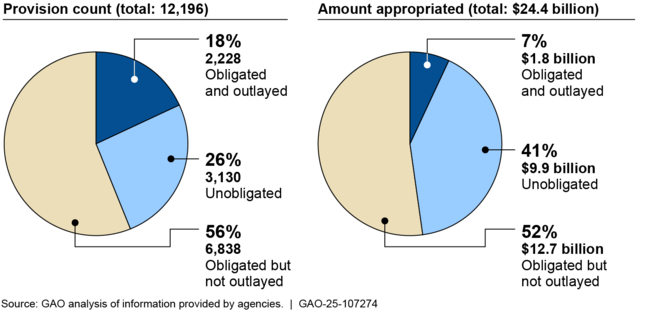Tracking the Funds: Agencies Continued Executing FY 2022 and 2023 Community Project Funding Congressionally Directed Spending Provisions
Fast Facts
As part of FY 2022 and 2023 appropriations, Members of Congress could request to designate a certain amount of funding for specific projects in their communities. While agencies often have discretion over how they award funds, Congress has directed them to distribute these funds to the designated recipients. We're tracking the funds to help ensure transparency.
FY 2022 and 2023 appropriations included $24.4 billion for 12,196 projects.
As of the end of FY 2023, agencies had made legal commitments to pay recipients—such as signing contracts or awarding grants—for 59% of the funds. Agencies distributed 7% of the funds.
![]()
Highlights
What GAO Found
As of the end of fiscal year 2023, agencies recorded obligations (e.g., took an action, such as signing a contract or awarding a grant, that created a legal duty to pay) toward 74 percent of the fiscal year 2022 and 2023 Community Project Funding/Congressionally Directed Spending (CPF/CDS) projects. Agencies made outlays (i.e., disbursed cash) toward 18 percent of these projects. Of the $24.4 billion in total funding for these provisions, agencies recorded obligations for 59 percent and outlays for 7 percent.
Agency-Recorded Obligations and Outlays for Fiscal Year 2022 and 2023 Community Project Funding/Congressionally Directed Spending, End of Fiscal Year 2023

Note: GAO included provisions for those agencies that recorded obligations for any amount of designated funds as obligated in this count.
Of the 19 agencies responsible for distributing the funds, 10 agencies recorded obligations for at least 90 percent of their projects and nine recorded obligations for at least 90 percent of their designated funds. Agencies recorded obligations toward more than half of the projects within all states (48 states plus the District of Columbia) and three of the four U.S. territories where projects are located. Agencies also recorded obligations for 18 of the 20 projects located across multiple states.
For provisions with funding that expired as of the end of fiscal year 2023, agencies recorded obligations for 99 percent of these projects (4,258), representing 99 percent of the designated funds ($5.17 billion), before the funding expired. An agency may not use the expired funds to incur new obligations but may use the funds to liquidate legally incurred obligations.
Agencies did not record any obligations for 31 provisions ($26.2 million) with designated funds that expired at the end of fiscal year 2023 for various reasons. For example, according to agency officials, some recipient organizations had closed, declined the funding, or did not follow agency application processes.
Why GAO Did This Study
The Consolidated Appropriations Acts, 2022 and 2023, and accompanying joint explanatory statements, together designated $24.4 billion for 12,196 provisions at the request of Members of Congress. These provisions designate a particular recipient—such as a nonprofit organization or local government—to receive an amount of funds to use for a specific project. These provisions are called “Community Project Funding” in the House of Representatives and “Congressionally Directed Spending” in the U.S. Senate.
The joint explanatory statements accompanying the Consolidated Appropriations Acts, 2022 and 2023, include provisions for GAO to review agencies' implementation of CPF/CDS contained in the acts. This report describes the amount of funds for these specific provisions that have been recorded as obligated and outlayed as of the end of fiscal year 2023, as reported by the 19 agencies responsible for distributing the funds.
GAO collected budget execution data—obligations and outlays—along with completion status and data quality information from each of the relevant agencies. These data reflect agencies' recorded obligations and outlays as of the end of fiscal year 2023. GAO also interviewed agency officials about their plans and processes for implementing the provisions.
For more information, contact Jeff Arkin at (202) 512-6806 or arkinj@gao.gov or Allison Bawden at (202) 512-3841 or bawdena@gao.gov.
